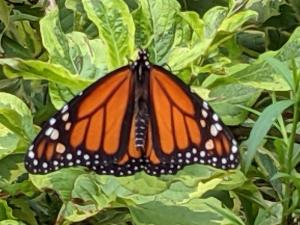Mill Pond Garden open to visitors July 31
Midsummer gardens are now changing gear, from flowers leading the display to foliage plants showing their muscles. It is also the peak for hibiscus, featuring the largest flowers of the garden year, with choices of several species and many stunning cultivars.
Mill Pond Garden will open to welcome visitors from 10 a.m. to 12:30 p.m., Sunday, July 31, at 31401 Melloy Court, Lewes.
Tickets, available at millpondgarden.com, are $15 to admit a vehicle with up to six visitors.
There is something wonderfully dramatic about large-leaved plants; they can make viewers feel like they have gone to their own tropical garden paradise without leaving home. Think bananas, palms, hostas, caladiums, taros, aspidistra, elephant ears, colocasia, cardoon, canna, ginger lily, agave, palm and the amazing evergreen hardy shrub fatsia. Add the colorful shimmers of maturing coleus, and the garden is transformed into a jungle. Ferns filling in the holes with their own magic include natives with fronds of four or five feet tall, like the giant ostrich fern or the even bigger royal fern, larger than many shrubs.
The hardy banana musa basjoo is a perennial in the Cape Region. It dies to the ground at frost and comes up late next spring, growing fast up to 12 feet. It is important that the tuber root stays dry in winter or it will rot, so the usual custom is to plant it on a mound or cover it to shed rainwater in winter.
Ginger lilies, elephant ears, caladiums and cannas are mostly hardy locally, except in very cold winters with low temperatures below 15 degrees F. They can be left in the ground or dug up and stored in an unfreezing garage or crawlspace.
Colocasias are tender; they should be dug up and stored in a space protected from freezing. Aspidistra is an evergreen that adds lushness to winter gardens, and it is very hardy here at least to 10 degrees F or lower. Needle palm and many kinds of agave are hardy here and even much farther north. Cardoon and coleus are annuals. Hostas are hardy perennials. All these big leaved-plants add much interest to the garden for the summer.
The huge flowers of hibiscus complement the tropical look of the big-leaved plants. Hibiscus for gardens include three types. The hardy, woody shrub Rose of Sharon, hibiscus syriacus, which blooms prolifically from mid-spring to late summer with rose-sized flowers in purple, red, blue or white, is a bit invasive, so be warned. The tropical, non-hardy Chinese woody shrubs called hibiscus chinensis are sold everywhere as seasonal patio decorations with large, varied-color flowers. The native perennial hibiscus moshuetos is available in pink, white or red, and the tall hibiscus coccinea comes in red and white with lime-green leaves, a Mill Pond Garden favorite. These native hibiscus have flowers 10 inches across and are popular with some pollinators. They bloom generously in full sun, and the native ones can do well in wet soils and dry, very useful in low or poorly drained garden sites where other plants cannot thrive.
The garden will also be featuring Joe Pye weed and many other pollinator plants attracting butterflies, as well as crape myrtles in full bloom, coleus, blooming water lilies, wonderful views of Red Mill Pond, wildlife and much more.
Mill Pond Garden will be showing these midsummer beauties for visitors to consider choices and find inspiration by seeing which garden plants can do well here in the Cape Region. Come enjoy the summer jungle with heavenly hibiscus; flip-flops are welcome. Visitors are asked to respect social distancing from other groups for safety.
Editor’s note: This story has been updated to reflect the correct event date. The incorrect date was listed in the Tuesday, July 26 Cape Gazette print edition.
























































